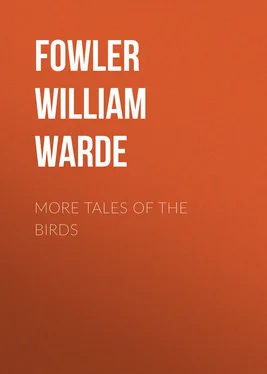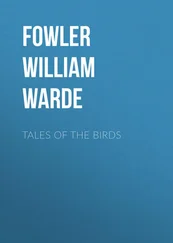William Fowler - More Tales of the Birds
Здесь есть возможность читать онлайн «William Fowler - More Tales of the Birds» — ознакомительный отрывок электронной книги совершенно бесплатно, а после прочтения отрывка купить полную версию. В некоторых случаях можно слушать аудио, скачать через торрент в формате fb2 и присутствует краткое содержание. Жанр: foreign_antique, foreign_prose, на английском языке. Описание произведения, (предисловие) а так же отзывы посетителей доступны на портале библиотеки ЛибКат.
- Название:More Tales of the Birds
- Автор:
- Жанр:
- Год:неизвестен
- ISBN:нет данных
- Рейтинг книги:3 / 5. Голосов: 1
-
Избранное:Добавить в избранное
- Отзывы:
-
Ваша оценка:
- 60
- 1
- 2
- 3
- 4
- 5
More Tales of the Birds: краткое содержание, описание и аннотация
Предлагаем к чтению аннотацию, описание, краткое содержание или предисловие (зависит от того, что написал сам автор книги «More Tales of the Birds»). Если вы не нашли необходимую информацию о книге — напишите в комментариях, мы постараемся отыскать её.
More Tales of the Birds — читать онлайн ознакомительный отрывок
Ниже представлен текст книги, разбитый по страницам. Система сохранения места последней прочитанной страницы, позволяет с удобством читать онлайн бесплатно книгу «More Tales of the Birds», без необходимости каждый раз заново искать на чём Вы остановились. Поставьте закладку, и сможете в любой момент перейти на страницу, на которой закончили чтение.
Интервал:
Закладка:
The Martin paused for a moment. “I really don’t quite know,” he presently said; “I never thought about it: we always do come here, and our ancestors always came, so I suppose we shall go on doing it. Besides, this is really our home. We were born here, you see, and when the heat begins in South Africa there comes a strange feeling in our hearts, a terrible homesickness, and we must go.”
“Then when you are once at home, why do you leave it to go away again so far?” asked Gwenny.
“My dear,” said the Martin, “if you will listen, and not ask so many questions beginning with ‘why,’ you may possibly learn something about it. Let me begin again. When we left Africa this year we went our usual way by some big islands in a broad blue sea, where we can rest, you know, and stay a day or two to recruit ourselves, – and then we made another sea-passage, and came to land near a large and beautiful town, with great numbers of ships lying in its harbour. Of course we are not afraid of towns or men: we have always found men kind to us, and willing to let us build our nests on their houses. Long ago, you know, we used to build in rocks, and so we do now in some places; but when you began to build houses of stone we took to them very soon, for then there was plenty of room for all of us, and no one to persecute us either, as the hawks used to do in the rocky hills. But really I begin to fear we shall be obliged to give it up again one of these days.”
“Why?” said Gwenny. “Don’t think of such a thing, now we’re friends. Why should you?”
“If you want to know why,” continued the Martin, “you must wait a little till I get on with my story. When we reached that fine town with the ships, we rested, as we always do, on any convenient place we can find, – chimneys, towers, telegraph wires; and of course as we come in thousands and much about the same time, the people look out for us, and welcome us. So they used to, at least: but of late years something has possessed them, – I don’t know what, – and they have set themselves to catch and kill us. It may be only a few wicked persons: but this year nearly all those towers and wires were smeared with some dreadful sticky stuff, which held us fast when we settled on it, until rough men came along and seized us. Hundreds and thousands of us were caught in this way and cruelly killed, and will never see their old home again.”
“Horrible!” cried Gwenny. “I believe I know what that was for: I heard mother reading about it in the paper. They wanted to sell the birds to the Paris milliners to put on ladies’ bonnets. But how did you escape?”
“Only by a miracle,” said the bird. “And indeed I do wonder that I’m safe here; I alighted on a tall iron fence near the sea, and instantly I felt my claws fastened to the iron, – not a bit would they move. A few yards off were two or three of my friends just in the same plight; and after a time of useless struggling, I saw to my horror a man come along, with a boy carrying a big bag. As the fence was high, he carried a pair of steps, and when he came to the other birds, he put these down and mounted them. Then he seized my poor friends, gave their necks a twist, and dropped them into the bag, which the boy held open below. It was sickening: I could see one or two which he had not quite killed struggling about at the bottom of the bag. Poor things, poor things! And there was I just as much at the mercy of these ruffians, and my turn was to come next.”
“It’s too horrible,” said Gwenny: “I wonder you can bear to tell it.”
“Ah, my dear,” said the Martin, “we have to get hardened to these things. And it’s good for you to hear my story, as you thought our lives were all happiness. Well, the man came along to me with his steps, and I struggled, and he chuckled, and in another moment it would have been all over. But just as he was going to grip me, he noticed that his boy was not below with the bag, and turning round he saw him a little way off in the road practising standing on his head, while the bag was lying in the dust with its mouth open. He shouted angrily, scolded the boy, and bade him bring back the bag directly; and when he came, gave him a kick in the back that made him squeal. Then he turned round again, seized me with a rough dirty hand, and wrenched my claws loose. Oh, the dreadful misery of that moment! But it was only a moment. At the very instant when he got me loose, the steps were pulled from beneath him, and as he struggled to save himself he let go his hold of me. Away I went as fast as I could fly, only looking back for a moment to see the man on his face in the dust, and the boy running away with all his might. I owe my life to that urchin’s mischief. He served his master out well, and I hope he didn’t get beaten for it afterwards.
“Well, I flew off, as I said, and it was a long time before I rested again. I was afraid that sticky stuff would hold me fast again, and I dipped into the rivers and scraped myself in the dusty roads, till I felt I had pretty well got rid of it. And no other misadventure happened while we were in France; and then there came a pleasant morning with a gentle breeze, in which we crossed the sea to this dear home of yours and ours, where no one wants to catch and kill us; and then we felt as happy as you fancy we always are. It was mid-April, and your fields looked so fresh and green, we had not seen such a green for nearly a whole year. The sun shone into the grass and lit it up, and forced the celandines and marigolds to open their blossoms all along the valley as we made our way to our old home here. Every now and then a delicious shower would come sweeping down from the west, and the labouring men would get under a tree, and throw old sacks over their shoulders to keep them dry; and the gentlefolk out walking in the roads would put up their umbrellas and run for it. But we, – ah! how we did enjoy those showers after the long weary journey! We coursed about and chatted to each other, and greeted our friends the Sand Martins by the river bank, knowing that the sun would be out again in a few minutes, and would bring all sorts of juicy insects out of the moistened grass. And when the rain had passed, and the blue sky above was all the bluer for the dark cloud in the distance, where the rainbow was gathering its brightness, what delicious feasts we had! how we did career about, and chatter, and enjoy ourselves!”
“I daresay you did,” said Gwenny. “And I’m very glad you are happy some time: but I’m sure there’s something dreadful coming yet!”
“Only too soon there came something dreadful,” the Martin continued, – “dreadful to us at least. The very next day – the day we came here – the soft west wind dropped, and no more showers came. Quite early in the morning I felt a difference – a dryness about the skin, and a tickling at the roots of my feathers, which I knew was not caused by those little creepers I told you of. And when I rested on the telegraph wires to scratch myself with my bill, I got so cold that I had to leave off and take to flight again. And then I knew that the wind was in the east , and that I should get very little good by flying, though fly I must, for the insects would not rise. Those of yesterday were dead already, nipped with a single night’s frost, and there was no sun to bring new ones to life. But we managed to get on fairly that day, and hoped that the east wind would be gone the next morning.”
“Why, what a difference the east wind does make to some people!” put in Gwenny. “You’re just like Aunt Charlotte; whenever she’s sharper than usual, my mother says it’s the east wind, and so it is, I believe. It dries up the snails, so that they go under the bushes, and she can’t find them. That’s the only way I can tell an east wind: the snails go in, and Aunt Charlotte gets put out.”
Читать дальшеИнтервал:
Закладка:
Похожие книги на «More Tales of the Birds»
Представляем Вашему вниманию похожие книги на «More Tales of the Birds» списком для выбора. Мы отобрали схожую по названию и смыслу литературу в надежде предоставить читателям больше вариантов отыскать новые, интересные, ещё непрочитанные произведения.
Обсуждение, отзывы о книге «More Tales of the Birds» и просто собственные мнения читателей. Оставьте ваши комментарии, напишите, что Вы думаете о произведении, его смысле или главных героях. Укажите что конкретно понравилось, а что нет, и почему Вы так считаете.












